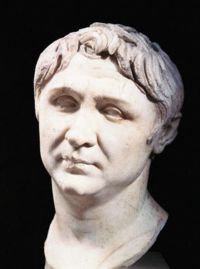
 Gnaeus Pompey was one of the key figures in the Roman revolution at the end of the period known as the Roman Republic. He rose to prominence serving Sulla in the first major Roman civil war, defeating the forces of Marius in Africa. Pompey quickly learned the political power of an army behind him. He led the Roman army against the rebels in Spain, and returned to Rome in triumph.
Gnaeus Pompey was one of the key figures in the Roman revolution at the end of the period known as the Roman Republic. He rose to prominence serving Sulla in the first major Roman civil war, defeating the forces of Marius in Africa. Pompey quickly learned the political power of an army behind him. He led the Roman army against the rebels in Spain, and returned to Rome in triumph.
In addition to his early successes, brutal though they are said to have been, Pompey was responsible for subduing the rebellious Spartacus and his army of slaves. This earned him the enmity of Crassus, who had already put down the main force of the slave revolt that had terrorized Italy. Pompey was awarded the task of ridding the pirates from the Mediterranean. He conquered Mithridates, King of Pontus, Tigranes, King of Armenia, and Antiochus, King of Syria, and went on to capture Jerusalem.
Returning to Rome, Pompey formed a coalition with Julius Caesar and Crassus, called the First Triumvirate. Later on, however, Pompey led his forces in a civil war against Caesar. Pompey’s forces were defeated at the Battle of Pharsalus in 48 BC. Pompey himself sought the safety of Egypt, where he was murdered by order of the pharaoh’s ministers.
